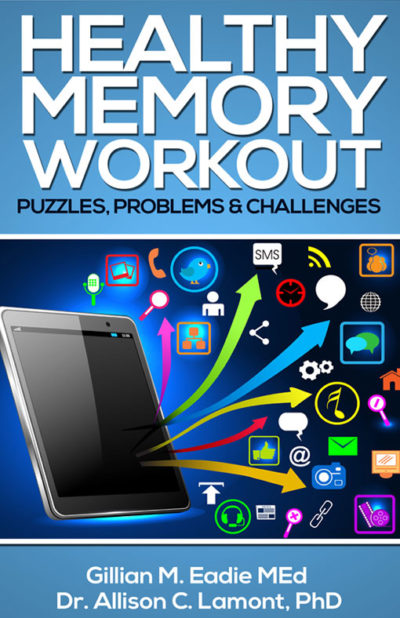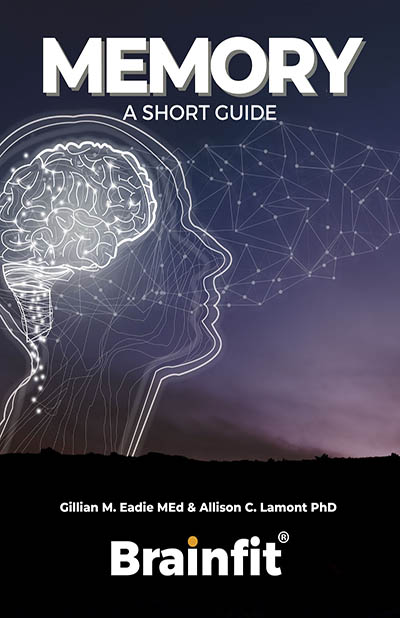 Have you had trouble remembering passwords or the time and location of an appointment you made a week ago?
Have you had trouble remembering passwords or the time and location of an appointment you made a week ago?
Or forgotten an important birthdays? Been out and worried about whether you’d taken your medication, turned out the light, turned off the oven?
So, what’s happening?
Are you losing your edge? Or getting Alzheimer’s?
No!
It’s NOT a ‘senior moment’
It’s NOT the catastrophic loss of brain cells
It’s NOT your brain shutting down
Your memory is still all there! But you do need to learn the ways to find it.
The Memory Doctor, Dr. Allison Lamont, PhD, says,
“Yes, if you do nothing at all to help your brain, you will lose some of your brain power after 55. But the good news is, you can re-grow your brain capacity, just as you can improve your fitness”.
Research has shown that the best results come from planned, systematic brain improvement. Even little changes in the way you act each day can bring positive results. Science hasn’t yet found a cure for Alzheimer’s, but most over-55 brains will definitely show improvement, and be able to push back brain decay.
Learn these NINE easy secrets for a youthful brain.
Start today.
1. Can You Hear Me?
31 million Americans have hearing problems. Is one of them you? Did you know that, if you are struggling to hear, it is more than likely that you are not creating a strong memory connection for the information you were trying to hear?. You can’t process and understand what you didn’t hear properly – so you will forget.
Have your hearing tested every 3 years after age 50.
Keep the volume down on your TV, Ipod or MP3. The last thing you want is more hearing loss. Protect your hearing and improve your memory.
2. Do I Look Fat In This?
The old adage, “fat and happy” just isn’t true any more. Obesity, or near obesity, is the enemy of a sharp and alert mind and obese people are usually very unhappy. While there is a lot of hype around about BMI (body mass index), there are indications that people with a healthy BMI (around 20) score much better on memory tests than those with BMI’s of 30 or more. I know there are exceptions to this general principle, but your all round health will benefit by thinking lean and trim when it comes to diet.
Reducing your calorie intake by 250 a day – either by saying No to that muffin, or burning off 250 calories with a brisk walk, will work wonders for your alertness and sharper memory. Aim to keep your BMI below 25.
Easting 4 or 5 small, balanced meals a day keeps your metabolism even and reduces the risks associated with high blood sugar levels.
Don’t know what your BMI is? Go to: www.prevention.com/bmicalculator to work it out.
3. Hello Doctor!
Miia Kivipelto and colleagues from the Karolinska Institute in Stockholm, Sweden, reported that obesity, hypertension, or high blood cholesterol in middle-age (approximately 50 years old) each significantly raised the likelihood of developing Alzheimer’s disease or a related dementia, in later life. Each of these risk factors roughly doubled the risk so that those in their 50s with all 3 conditions ran a risk of developing dementia that was 6 times higher than for folks with none of them.
Get checked out for blood pressure, cholesterol levels.
4. Pass the Salad, Please.
You’ve always known that vegetables are supposed to be good for you, right? Well, here’s the proof!
Jae Hee Kang reports that research, conducted over 10 years at Harvard Medical School , found that middle-aged women who consistently ate generous portions of leafy or cruciferous green vegetables were better able to preserve their cognitive abilities into advanced age than those who did not. Women who ate 8 or more servings (1 serving = 1/2 cup) of green, leafy vegetables (such as spinach or romaine lettuce) a week demonstrated the cognitive function of someone 1.7 years younger than those who ate 3 or fewer servings per week.
Green leafy vegetables seemed to preserve cognitive function best, perhaps because of their high vitamin B and antioxidant content, (e.g. vitamin C and folate) which may prevent the deleterious effects of aging on the brain caused by free radicals
So eat up that salad and eat more greens.
5. “Stop the noise! I can’t think!”
Have you ever felt like this? Well, actually, it’s probably true. If there are lots of distractions around you, then it is much more likely that you won’t remember, unless you have paid particular attention. When you want to remember, reduce the background noise.
6. Practice the Seven Second Rule!
It takes 7 seconds of concentration or processing ot commit information to memory. You’ll find full details of this amazing fact in the Lamont and Eadie book: Seven Second Memory plus six other powerful memory techniques. Rewire your brain for a youthful mind.
For now, though, think of paying attention as shining a flashlight on what you want to remember – and do this for seven seconds, focusing on the details and creating as many clues as you can for your memory.
7. Not just a Fishy Tale!
It’s now well-known that the Omega-3 fatty acids found in most types of fish (but particularly cold water fish) are brain-friendly. People who eat any type of fish at least once a week do appreciably better on mental tests than those who avoid seafood.
Try to eat at least two fish dishes weekly; if fish is not for you then, at the very least, consider taking Omega-3 dietary supplements.
8. Move it, Baby, Move it!
You already know that exercise is good for you. Being fit gives you a great feeling of well-being. But did you know that exercise is great for your brain also?
Even a 20 minute walk a day will help activate circulation that is so vital for brain growth. 40 minutes to an hour is even better.
9. Your Brain, Your Friend, Your Future.
Do you believe you have a sharp brain? Maybe not, since you are reading this, but I want you to change that.
Dr. Lamont says that having a positive attitude and strong self-belief in the power of your brain are very important in achieving brain growth.
You can do it!
Take these nine actions today and you are on your way to a better performing brain. Not only that, you are building up a buffer against brain decay in later life.
People who are purposeful, conscientious, sociable and self-motivated show less cognitive decline and fewer Alzheimer’s disease symptoms.
Make a conscious effort to stay on task, take an interest in new activities and engage in life around you.
Your brain will love you for it.
——————————————————
This article was reproduced with permission of its author Gillian Eadie, c0-founder of the Memory Foundation. Gillian is an award-winning educator with more than 20 years as a principal at several prestigious private schools and is a Churchill Fellow. For more free help and personal advice on diet, exercise, brain food and improving your memory, please visit the Memory.Foundation.




